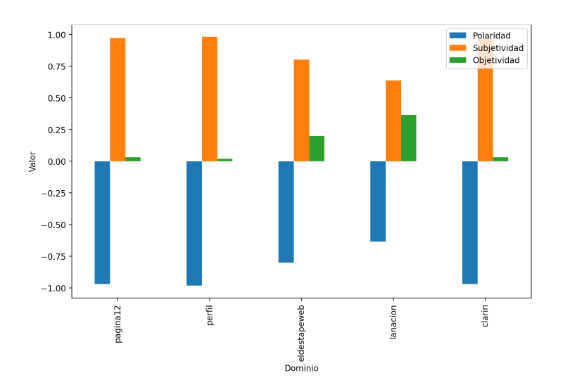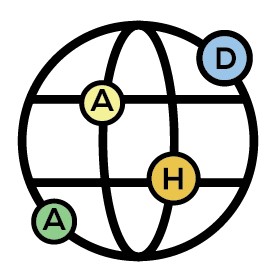Análisis de la situación presupuestaria 2024 de las Universidades Nacionales en Argentina según los medios de comunicación de mayor alcance a partir del Procesamiento del Lenguaje Natural
DOI:
https://doi.org/10.24215/27187470e059Palabras clave:
recuperación de la información, análisis-contenido, lenguaje natural, textoResumen
En el ámbito del Procesamiento del Lenguaje Natural, el análisis de sentimientos puede aplicarse en campos como las políticas públicas y gestión de reputación, percepción de clientes o usuarios, detección de tendencias en redes sociales. Este artículo explora la herramienta Streamlit, una biblioteca de Python, aplicada al análisis de la situación presupuestaria de las Universidades Nacionales en Argentina en 2024, según los cuatro medios periodísticos de mayor alcance, para detectar cómo en sus argumentos manifiestan un determinado perfil ideológico. La cuestión de la subjetividad versus objetividad sigue siendo un tema teórico, político y social de importancia en las Ciencias Humanas, particularmente ante el cisma ideológico de las últimas décadas a nivel global y fundamentalmente en nuestro país. Los resultados del trabajo evidencian polaridad en las argumentaciones, moderada objetividad y alta subjetividad en la versión de los acontecimientos que dichos medios expresan.
Descargas
Citas
Allaire, J. y Chollet, F. (2021). Keras: R Interface to ‘Keras’. R package version 2.4.0. https://CRAN.R-project.org/package=keras
Bird, S., Klein, E. y Loper, E. (2009). Natural Language Processing with Python. O'Reilly Media.
Hunter, J. D. (2007). Matplotlib: A2D Graphics Environment. Computing in Science & Engineering, 9(3), 90-95. http://dx.doi.org/10.1109/MCSE.2007.55
Hutto, C. y Gilbert, E. (2014). VADER: A Parsimonious Rule-Based Model for Sentiment Analysis of Social Media Text. Proceedings of the International AAAI Conference on Web and Social Media, 8(1), 216-225. https://doi.org/10.1609/icwsm.v8i1.14550
Zemmelman H. (1992). Los horizontes de la razón. Uso crítico de la teoría (pp. 131-137). Anthropos.

Descargas
Publicado
Cómo citar
Número
Sección
Licencia
Derechos de autor 2024 Gustavo Navarro

Esta obra está bajo una licencia internacional Creative Commons Atribución-CompartirIgual 4.0.
Los autores que publican en esta revista están de acuerdo con los siguientes términos:
- Los artículos publicados en la revista se encuentran disponibles en acceso abierto.
- Los autores conservan los derechos de autor y garantizan a la revista el derecho de ser la primera publicación del trabajo al igual que licenciarlo bajo una Licencia Creative Commons Atribución-CompartirIgual 4.0 Internacional (CC BY-SA 4.0), que permite copiar y redistribuir el material en cualquier medio o formato y remezclar, transformar y construir a partir del material bajo los siguientes términos: debe dar crédito de manera adecuada, brindar un enlace a la licencia, e indicar si se han realizado cambios.
- Los autores pueden depositar el trabajo en un repositorio de preprints, postprints, establecer por separado acuerdos adicionales para la distribución no exclusiva de la versión de la obra publicada en la revista (por ejemplo, situarlo en un repositorio institucional o publicarlo en un libro), con un reconocimiento de su publicación inicial en esta revista.
- Se alienta a los/as autores/as a realizar el depósito de datos en SEDICI, o en cualquier otro repositorio de datos de investigación (como Zenodo, donde la AAHD ha creado un repositorio temático para HUMANIDADES DIGITALES), de manera previa a realizar el envío de la contribución a la revista. De este modo, al remitir el artículo solo se deberá indicar la URL donde se encuentran los datos de investigación.

























